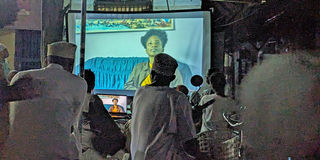ZIFF 2024: A year of mixed reactions and growing pains

What you need to know:
- As one of Africa’s premier cultural events, ZIFF has long been a beacon for filmmakers across the continent, but this year’s edition revealed some cracks in the festival’s illustrious façade.
The Zanzibar International Film Festival (ZIFF) 2024 concluded recently, leaving a blend of excitement and frustration in its wake.
As one of Africa’s premier cultural events, ZIFF has long been a beacon for filmmakers across the continent, but this year’s edition revealed some cracks in the festival’s illustrious façade.
The festival, which took place from August 1 to August 4, celebrated its 27th anniversary with the theme of rejuvenation. One significant change this year was the festival's decision to eliminate entry fees for attendees, a new initiative designed to encourage community gathering.
Bongo Movies: A dimmed spotlight
The Tanzanian film industry, affectionately known as Bongo Movies, did not have its best showing at this year’s festival. Of the 12 award categories, the film industry won just four awards.
Uhuru Wangu received the Emerson Award; Oceanmania was honoured with Best Short Film; John Elisha earned Best Actor in Tanzania; and Jesca Mtoi was awarded Best Actress in Tanzania.
Meanwhile, major awards such as Best East African Film, Best Actor East Africa, Best Actress East Africa, and Best TV Drama Series East Africa were won by Somalia, Uganda, and Kenya.

“The issue that has been holding us back is quality. We need to improve the quality of our production. We didn’t achieve what we were aiming for this time. Others are producing better work, so we should learn from them to enhance our performance in the future,” says Hakeem Jumaa, an actor in the series Dosari.
Film enthusiasts have called for a greater focus on developing more captivating and compelling stories in local dramas.
“I anticipated that local dramas would shine on awards night, but the results were otherwise. The reality is that our films are losing the appeal that fans desire. Many are beginning to lose their audience, so I urge filmmakers to concentrate on producing high-quality work. By doing so, we could set the standard and excel in awards like this,” shares Farida Hussein, a film enthusiast who attended the awards night on Sunday, August 4.
Abdul Ramadhani suggests that not winning awards should be viewed positively, as it provides an opportunity for film producers and actors to analyse the winning films and use them as a learning tool to enhance their work.
“Now is not the time to criticise our films for underperforming. Instead, filmmakers should focus on identifying areas for improvement and significantly enhancing their work, aiming to achieve greater success and win more awards,” he shares.
On the same line, ZIFF Director Hatib Madudu notes that not winning awards doesn’t indicate a problem with local films.
“Bongo films face no inherent issues; they actually perform very well. Historically, these films didn’t win awards in their early years at ZIFF. However, in the past three years, they have been recognised, with films such as Binti (2021), Vuta Nikuvute (2022), and Yonii (2023) earning accolades," Madudu explains.

Workshops: Not enough time to shine
Beyond the screenings, ZIFF is also known for its educational workshops, which provide invaluable learning opportunities for up-and-coming filmmakers. However, this year’s workshops were a point of contention. Many attendees felt that the sessions were too brief and lacked the depth required to foster real growth and development.
“The workshops didn’t allow enough time for in-depth learning and interaction,” comments a filmmaker who attended several sessions. “We need more comprehensive sessions to truly benefit from these opportunities.”
Kenny Madshot, a film producer, shares, “This is my second time attending the ZIFF festival, and I recall that in the past, workshops would last up to two days. This year, however, there has been a noticeable change. I hope to see improvements and better organisation next year so that the workshops and classes can be more thorough and beneficial.”
A call for local sponsorship
One of the highlights that opened the festival was ZIFF CEO Joseph Mwale's statement urging local sponsorship to increase. He shares the declining momentum of the festival, describing it as a warning alarm for the community.
“The slowing down of ZIFF serves as a warning alarm for all of us. At this rate, we risk losing what we hold,” he cautions. Mwale urges the community to step up and contribute to the festival’s future. “This is a local festival that now depends on local support; if we do not act now, we may wake up one day to find it gone,” he explains.
Master Classes: A glimmer of hope
Despite the challenges, there were significant positives. Bongo Movie actors and filmmakers attended master classes that aimed to elevate their craft and enhance the business side of East African cinema. These sessions focused on improving film quality and developing more robust business models.
Looking forward: A path to improvement
ZIFF 2024 may have had its share of growing pains, but it also reinforced the festival’s role as a crucial platform for African filmmakers. The mixed reactions serve as a valuable feedback loop, guiding the organisers towards better planning and execution in future editions.
With Mwale’s call for increased local support and a commitment to addressing the concerns raised, there is optimism that ZIFF will continue to evolve and uphold its reputation as a cornerstone of African cinema.




